Pfadnavigation
- Startseite
- Institut für Theaterwissenschaft (WE7)
- Musik
- Ernst von Siemens Musikstiftungsprofessur
Ernst von Siemens Musikstiftungsprofessur
Lehre und Veranstaltungen
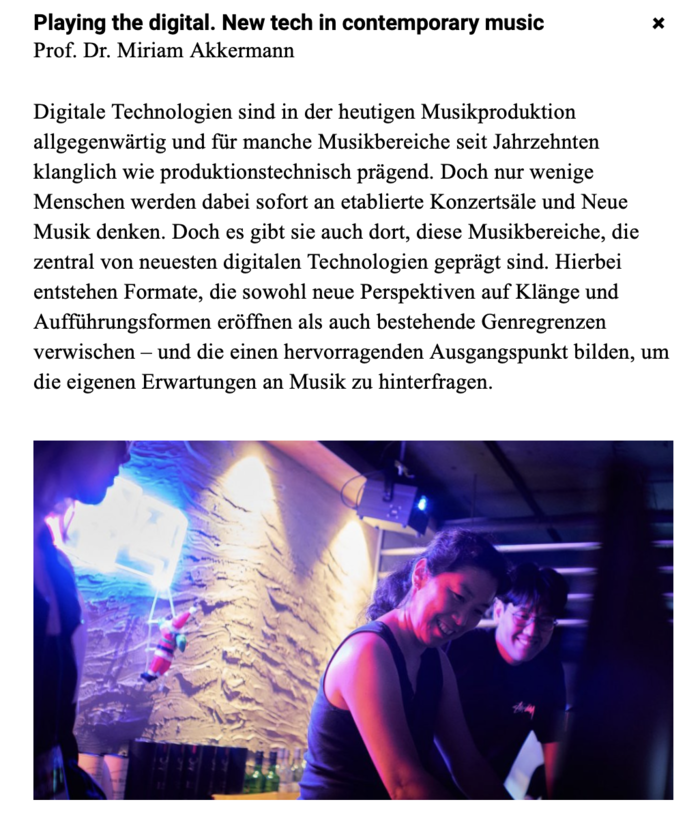
Medienspiegel
“Jeder Perspektivwechsel ist gut”
Monika Voithofer im Gespräch mit Miriam Akkermann
erschienen in: Neue Zeitschrift für Musik 3/2024 , Seite 10.
Podcast/Podiumsdiskussion "Generative KI-Modelle und Forschungsdaten: Chancen und Herausforderungen"
Mit Jacqueline Klusik-Eckert am 02.07.2024
#arthistoCast Special #3: NFDI4Culture Cultural Community Plenary 2024.
Ankündigung ScienceNotes @ Silbersalz (1.11.2024 Halle)
"Schlaf, Versuchsperson, schlaf! Die Musikwissenschaftlerin Miriam Akkermann untersucht im Rahmen des Forschungsprojekts Lullabyte Auswirkungen von Musik auf Schlaf" von Pepe Egger, in:
Tagesspiegel-Beilage vom 29. November 2024
Miriam Akkermann spricht über Lullabyte in:
Radiosendung „Quarks“ vom 13.1.2025 auf WDR5
ab 1:14:30
Susanne Schnabel über Thomas Kessler und Lullabyte
Miriam Akkermann im Gespräch mit Axel Dorloff über Musik und Schlaf im Inforadio vom RBB (2.2.2025), 35min.
Über Lullabyte und Forschung zu Wiegenliedern:
"Schlaf oder stirb: Wiegenlieder haben mitunter rabiate Texte", in: Süddeutsche Zeitung (28. Mai 2025)
dpa:250528-930-600667/1
Miriam Akkermann im Interview: „Schlaf, Kindlein, schlaf – Warum Wiegenlieder oft nicht harmlos sind“ (28. Mai 2025, 17:19 Uhr) im Deutschlandfunk Kultur „Studio 9“ ist der Überblick mit Hintergrund. Interviews, Reportagen, Kritiken – mit originellen Gesprächspartnern.

Lullabyte Sleep Concert 2025
Medienspiegel Schlafkonzert:
https://www.tagesschau.de/kultur/schlafkonzert-100.html
Regine Bruckmann (RBB): "Ein Konzert, das man wahrscheinlich verschläft" auf: Tagesschau.de (7.7.2025)
https://www.inforadio.de/rubriken/interviews/2025/07/04/was-macht-musik-mit-unserem-schlaf-.html
Interview Stephan Oszvath (inforadio) mit Prof. Dr. Akkermann
"Forschungsprojekt: Was macht Musik mit unserem Schlaf?" in: inforadio.de (4.7.2025)
Interview von Luis Packard (Radio Paradiso) mit Prof. Akkermann: 98.2 Radio Paradiso (4.7.2025)
Ankündigung
Erleben Sie ein Konzert der besonderen Art – eine ganze Nacht mit Live-Musik zum Schlafen, Schlummern und Träumen. Alice Eldridge und Kirsten Reese spielen Musik aus Naturaufnahmen, elektronischen Klängen und live erzeugten Sounds für Sie.
Das Schlafkonzert ist Teil von Lullabyte, einem EU geförderten Doktorandennetzwerk in dem zehn Nachwuchswissenschaftler:innen zu Musik und Schlaf forschen.
Das Konzert findet als Teil des Festivals Heroines of Sound im ZK/U (Berlin-Moabit) statt, Einlass 21–22 Uhr, inklusive Frühstück um 7 Uhr. Bitte Schlafsack selbst mitbringen; Wasserflaschen können mit in den Konzertraum genommen werden.
Lullabyte – Sleep concert
Kirsten Reese and Alice Eldridge, electronics
Concept by Miriam Akkerman
https://www.heroines-of-sound.com/festival-2025/
Friday July 4, 2025
22.00 p.m. -7.00 a.m.
ZK/U– Zentrum für Kunst und Urbanistik
Siemensstr. 27, 10551 Berlin
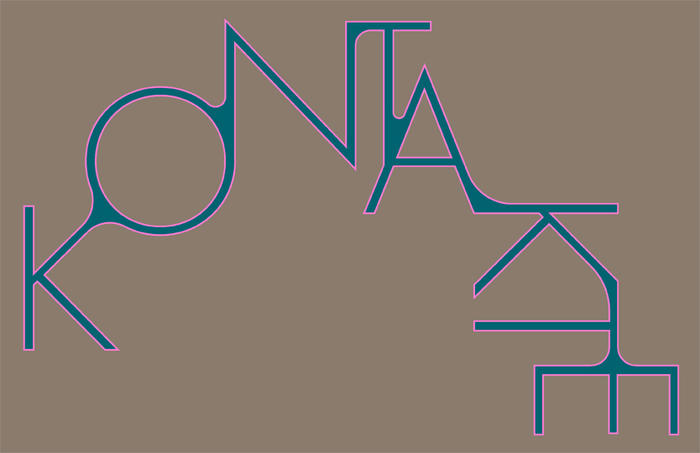
DEGEM Konzert in der AdK
Sonntag, 29.6.2025, Akademie der Künste, Hanseatenweg 10, 10557 Berlin, 18 Uhr, Halle 2
Sonic Encounters
DEGEM Jahreskonzert
mit Werken von
Teresa Carrasco,
Ketevan Dolnikova-Hahn,
Marisol Jiménez,
Julia Mihály,
Maria Pelekanou,
Viola Yip
In Kooperation mit dem Seminar für Musikwissenschaft, Ernst-von-Siemens Musikstiftungsprofessur, FU Berlin
Im Rahmen von Kontakte 2025 – Festival für Elektroakustische Musik und Klangkunst des Studios für Elektroakustische Musik der Akademie der Künste Berlin

Sound Sessions der Studierenden
Die Sound Sessions sind ein neues Konzertformat, das im Seminar für Musikwissenschaft der FU „Musik machen ausstellen“ entstanden ist. Die HörHöhle ist ein transformierter Raum, in dem musikalisch eine breite Vielfalt an Genres und Stilen zur Aufführung gebracht wird. Klanglich und visuell, wie auch atmosphärisch, passiert diese Transformation, womit der Hörsaal zu einem diversen Ort mit Wohlfühlcharakter wird. Konzipiert und kuratiert wurde die erste Edition von Mia Hadžikadunić, Max Tönshoff, Julia Gooß und Nick Krause.
14.01.2025 | 18:00 c.t. - 20:00 (siehe Fotos)
19.11.2024 | 18:00 c.t. - 20:00
Hörsaal im Institut für Theaterwissenschaft der Freien Universität Berlin
Grunewaldstraße 35, 12165 Berlin

Medienspiegel
“Jeder Perspektivwechsel ist gut”
Monika Voithofer im Gespräch mit Miriam Akkermann
erschienen in: Neue Zeitschrift für Musik 3/2024 , Seite 10.
Podcast/Podiumsdiskussion "Generative KI-Modelle und Forschungsdaten: Chancen und Herausforderungen"
Mit Jacqueline Klusik-Eckert am 02.07.2024
#arthistoCast Special #3: NFDI4Culture Cultural Community Plenary 2024.
Ankündigung ScienceNotes @ Silbersalz (1.11.2024 Halle)
"Schlaf, Versuchsperson, schlaf! Die Musikwissenschaftlerin Miriam Akkermann untersucht im Rahmen des Forschungsprojekts Lullabyte Auswirkungen von Musik auf Schlaf" von Pepe Egger, in:
Tagesspiegel-Beilage vom 29. November 2024
Miriam Akkermann spricht über Lullabyte in:
Radiosendung „Quarks“ vom 13.1.2025 auf WDR5
ab 1:14:30
Susanne Schnabel über Thomas Kessler und Lullabyte
Miriam Akkermann im Gespräch mit Axel Dorloff über Musik und Schlaf im Inforadio vom RBB (2.2.2025), 35min.
Über Lullabyte und Forschung zu Wiegenliedern:
"Schlaf oder stirb: Wiegenlieder haben mitunter rabiate Texte", in: Süddeutsche Zeitung (28. Mai 2025)
dpa:250528-930-600667/1
Miriam Akkermann im Interview: „Schlaf, Kindlein, schlaf – Warum Wiegenlieder oft nicht harmlos sind“ (28. Mai 2025, 17:19 Uhr) im Deutschlandfunk Kultur „Studio 9“ ist der Überblick mit Hintergrund. Interviews, Reportagen, Kritiken – mit originellen Gesprächspartnern.

Documentation and Archiving in the Digital Age. Approaches to Sound and Music
In this lecture series, we will introduce different approaches to documenting and archiving music and sound from different disciplinary perspectives such as music studies, media/film studies, informatics, and archival studies.
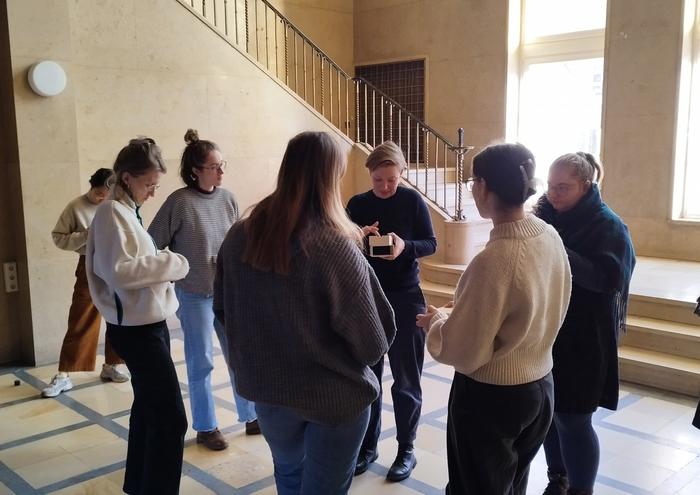
Klangkunst im öffentlichen Raum
In diesem Seminar werden insbesondere Arbeiten betrachtet, die im sogenannten »öffentlichen Raum« (z.B. urbaner Raum oder andere, frei zugängliche Orte) zu erleben sind. Welche Arten von künstlerischen Arbeiten gibt es im Bereich Klangkunst? Wie sollen diese Arbeiten auf die Personen wirken, die sie wahrnehmen? Und welche Rolle spielt der »öffentliche Raum« dabei?
Bildquellen

Schlafkonzert2024
Bildquelle: —

Kontakte-Festival
Bildquelle: —

Sound Sessions 1
Bildquelle: —

science notes Halle
Bildquelle: —

Maebh Placeholders ipods
Bildquelle: —

Workshop mit Franziska Windisch
Bildquelle: Workshop von Franziska Windisch an der Musikwissenschaft FU Berlin (13.1.2025)
Forschung
Lullabyte public lectures
Prof. Dr. Stefan Weinzierl (TU Berlin):
"Rooms as transformers of sound. From classrooms to cathedrals"
Wednesday, July 2, 2025
18:00–20:00
Hörsaal, Freie Universität Berlin,
Institut für Theaterwissenschaft,
Seminar für Musikwissenschaft,
Grunewaldstr. 35, 12165 Berlin
The talk first introduces the Room Acoustical Quality Inventory (RAQI), a psychological measurement tool for evaluating the acoustic perception of venues for music and speech. For this purpose, a focus group of room acoustics experts first compiled a comprehensive list of items relevant to the perception of room acoustics. Subsequently, 190 test subjects evaluated their acoustic impression of 35 binaurally simulated rooms from two listening positions with different audio content. Exploratory and confirmatory factor analyses of the questionnaire data yielded three possible solutions for the dimensions of acoustic room impression with four, six, and nine factors. These solutions and the associated RAQI items were tested for reliability, validity, and various types of measurement invariance. This psychometrically evaluated measurement instrument can be used to evaluate rooms, for room acoustic design, and for the further development of room acoustic parameters that predict the primary acoustic properties of venues for music and speech. Finally, a theory of aesthetic appreciation of spaces for music is presented, which is the subject of ongoing research.
Keynote lecture for summer school: Lullaybte. Unravelling the Effects of Music on Sleep through Musicology, Neuroscience, Psychology and Computer Science. Doctoral Network funded by Horizon Europe (HORIZON) Marie Skłodowska-Curie Actions
Alice Eldridge (University of Sussex):
"Tuning in to soundscape dynamical complexity"
Thursday, July 3,
14:00–16:00
Hörsaal, Freie Universität Berlin,
Institut für Theaterwissenschaft,
Seminar für Musikwissenschaft,
Grunewaldstr. 35, 12165 Berlin
Natural soundscapes are dynamic, emergent patterns of acoustic activity which arise from the interactions between physical, biological and anthropogenic processes. The soundscape both reflects and influences ecological processes, and therefore provides valuable information about ecological status. In this talk I will share some initial results from our current research exploring a range of approaches to map, model and measure the dynamical complexity of soundscapes across temporal resolutions - from diel patterns, through chorus dynamics to short term temporal complexity. With this approach we integrate ecosemiotic and complex systems perspectives and develop a conception of the soundscape as a dynamic space of information flow.
Julia von Thienen (German University of Digital Science, Potsdam):
"Exploring the Rhythms of Mind: Music, Sleep, and Creativity at the Crossroads of Science and Innovation"
Thursday, July 3,
16:15–18:00
The interplay between music, brain dynamics, and human experience is an emerging frontier rich with scientific promise and practical potential. This talk explores how music and sleep intersect with creativity, team bonding, and cognitive performance – an inherently interdisciplinary inquiry bridging neuroscience, computer science, musicology, sleep research, and innovation studies.
The presentation begins by introducing design thinking as an approach to innovation, and neurodesign as its area of specialization emphasizing neuroscientific perspectives on the phenomena under study. Both music and sleep have been long-standing topics of research in this context, particularly in relation to creativity. Music is commonly used to influence brain dynamics and mental states, especially during active creative work. Different types of music support different stages of the creative process, each requiring distinct cognitive mindsets. While many stages benefit from elevated EEG alpha activity, additional cognitive demands vary depending on the specific tasks involved.
In addition, music is used to enhance bonding within creative teams, particularly through rhythmic elements that induce psychophysiological synchrony, helping teams align and operate on a shared wavelength – an effect well-documented in our field. Sleep, dreams, mind-wandering, and transitional states between wakefulness and sleep have also been explored, highlighting phenomena of relaxation versus muscle tension and stress, mental imagery, and creativity.
Drawing on insights from both academic research and applied projects in neurodesign and the broader academic literature, this session underscores how research findings can be integrated into practical, artistic, and functional innovation.
Lullabyte public lectures
Prof. Dr. Stefan Weinzierl (TU Berlin):
"Rooms as transformers of sound. From classrooms to cathedrals"
Wednesday, July 2, 2025
18:00–20:00
Hörsaal, Freie Universität Berlin,
Institut für Theaterwissenschaft,
Seminar für Musikwissenschaft,
Grunewaldstr. 35, 12165 Berlin
The talk first introduces the Room Acoustical Quality Inventory (RAQI), a psychological measurement tool for evaluating the acoustic perception of venues for music and speech. For this purpose, a focus group of room acoustics experts first compiled a comprehensive list of items relevant to the perception of room acoustics. Subsequently, 190 test subjects evaluated their acoustic impression of 35 binaurally simulated rooms from two listening positions with different audio content. Exploratory and confirmatory factor analyses of the questionnaire data yielded three possible solutions for the dimensions of acoustic room impression with four, six, and nine factors. These solutions and the associated RAQI items were tested for reliability, validity, and various types of measurement invariance. This psychometrically evaluated measurement instrument can be used to evaluate rooms, for room acoustic design, and for the further development of room acoustic parameters that predict the primary acoustic properties of venues for music and speech. Finally, a theory of aesthetic appreciation of spaces for music is presented, which is the subject of ongoing research.
Keynote lecture for summer school: Lullaybte. Unravelling the Effects of Music on Sleep through Musicology, Neuroscience, Psychology and Computer Science. Doctoral Network funded by Horizon Europe (HORIZON) Marie Skłodowska-Curie Actions
Alice Eldridge (University of Sussex):
"Tuning in to soundscape dynamical complexity"
Thursday, July 3,
14:00–16:00
Hörsaal, Freie Universität Berlin,
Institut für Theaterwissenschaft,
Seminar für Musikwissenschaft,
Grunewaldstr. 35, 12165 Berlin
Natural soundscapes are dynamic, emergent patterns of acoustic activity which arise from the interactions between physical, biological and anthropogenic processes. The soundscape both reflects and influences ecological processes, and therefore provides valuable information about ecological status. In this talk I will share some initial results from our current research exploring a range of approaches to map, model and measure the dynamical complexity of soundscapes across temporal resolutions - from diel patterns, through chorus dynamics to short term temporal complexity. With this approach we integrate ecosemiotic and complex systems perspectives and develop a conception of the soundscape as a dynamic space of information flow.
Julia von Thienen (German University of Digital Science, Potsdam):
"Exploring the Rhythms of Mind: Music, Sleep, and Creativity at the Crossroads of Science and Innovation"
Thursday, July 3,
16:15–18:00
The interplay between music, brain dynamics, and human experience is an emerging frontier rich with scientific promise and practical potential. This talk explores how music and sleep intersect with creativity, team bonding, and cognitive performance – an inherently interdisciplinary inquiry bridging neuroscience, computer science, musicology, sleep research, and innovation studies.
The presentation begins by introducing design thinking as an approach to innovation, and neurodesign as its area of specialization emphasizing neuroscientific perspectives on the phenomena under study. Both music and sleep have been long-standing topics of research in this context, particularly in relation to creativity. Music is commonly used to influence brain dynamics and mental states, especially during active creative work. Different types of music support different stages of the creative process, each requiring distinct cognitive mindsets. While many stages benefit from elevated EEG alpha activity, additional cognitive demands vary depending on the specific tasks involved.
In addition, music is used to enhance bonding within creative teams, particularly through rhythmic elements that induce psychophysiological synchrony, helping teams align and operate on a shared wavelength – an effect well-documented in our field. Sleep, dreams, mind-wandering, and transitional states between wakefulness and sleep have also been explored, highlighting phenomena of relaxation versus muscle tension and stress, mental imagery, and creativity.
Drawing on insights from both academic research and applied projects in neurodesign and the broader academic literature, this session underscores how research findings can be integrated into practical, artistic, and functional innovation.
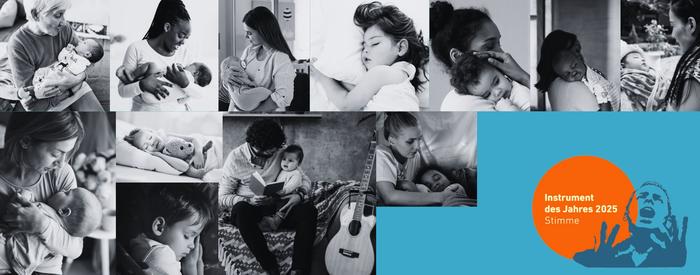
Berlin schläft ein
Schlaflieder verbinden Menschen, Generationen, Herzen. Sie begleiten uns in den ruhigsten Momenten, schenken Trost und Geborgenheit. Berlin ist Heimat von Menschen aus mehr als 170 Nationen mit zahlreichen unterschiedlichen Sprachen und Kulturen. Sie alle bewahren Wiegenlieder in ihrem kollektiven Gedächtnis. Diese sprachliche und musikalische Vielfalt pflegt und würdigt der Landesmusikrat Berlin im Jahr der Stimme in Kooperation mit dem Berliner Ethnologischen Museum (Humboldt Forum), der Ernst von Siemens Musikstiftungsprofessur an der Freien Universität Berlin (FU Berlin) und dem Endangered Languages Archive an der Berlin Brandenburgischen Akademie der Wissenschaften.
„Berlin schläft ein“ heißt das künstlerische und kulturelle Experiment, das den reichen Schatz an Schlafliedern sammelt, archiviert und allgemein zugänglich macht. Ziel ist die Erhaltung dieses immateriellen kulturellen Erbes und die Förderung des Singens in der Familie.
Die Vielfalt der gesammelten Lieder wird in einem geschützten Rahmen über die Online-Plattform des Endangered Languages Archive der Berlin-Brandenburgischen Akademie der Wissenschaften zugänglich gemacht und zusätzlich in den Sammlungen des Berliner Ethnologischen Museums (Humboldt Forum) langzeitarchiviert. Die gesammelten Lieder werden außerdem im Lauf des Jahres in Konzerten, Workshops und Ausstellungen präsentiert, um ihre Schönheit und Vielfalt sichtbar zu machen.
Berlin schläft ein – Aufnahme-Session an der Freien Universität Berlin: Sa., 28. Juni 2025, 18:30–21:30, Silberlaube, Fabeckstr. 25, 14195 Berlin-Dahlem, Raum JK 24/140
. Bitte anmelden: https://www.landesmusikrat-berlin.de/berlin-schlaeft-ein/
Hier können Sie sich für weitere Informationen und die Aufnahme-Sessions registrieren:
https://www.survio.com/survey/d/berlin-schlaeft-ein
Projektpartner:
Franziska Stoff
, Generalsekretärin Landesmusikrat Berlin e.V.
Dr. Mandana Seyfeddinipur, Direktorin, Endangered Languages Archive und Endangered Languages Documentation Programme
Dr. Maurice Mengel, Berliner Ethnologisches Museum (Humboldt Forum)
Prof. Dr. Miriam Akkermann, Freie Universität Berlin, Lullabyte
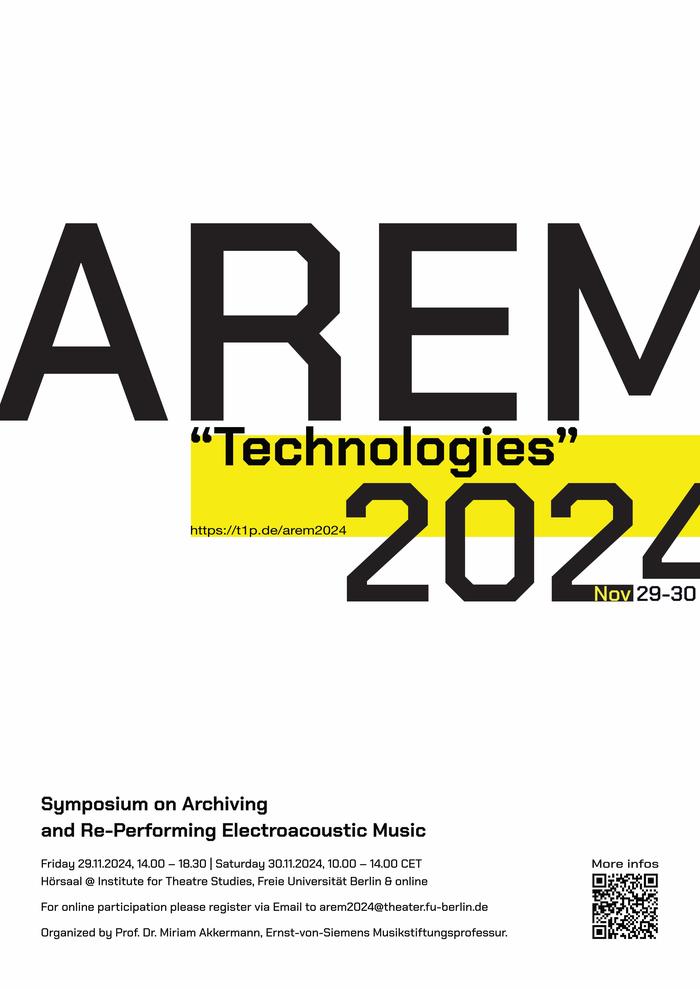
Symposium on Archiving and Re-Performing Electroacoustic Music AREM 2024
29 November - 30 November 2024
speakers:
Matthias Kassel (Paul Sacher Stiftung, Basel),
Lara Le Drian (Philharmonie Luxembourg),
Thomas Neuhaus (Folkwang Universität Essen),
Sarah Youssef (Digi-Kunst.nrw),
Anita Jóri (Leuphana Universität Lüneburg),
Mara Helmuth (University of Cincinnati),
Marc Battier,
Melissa Portaels (Artes KU Leuven Libraries),
Pierre Couprie (Paris-Saclay University, RASM-CHCSC),
Nathanaëlle Raboisson (Motus Musical Ensemble, IReMus),
Nadja Wallaszkovits (ABK Stuttgart),
Anna Schäffler,
Felix Mittelberger (ZKM Karlsruhe),
Miller Puckette,
Serge Lemouton (IRCAM, Paris)
Victor Zappi (Northeastern University)
Please register.

Lullabyte
Music exerts strong effects on the human brain, as evidenced by both subjective emotional reactions and overt changes in neurophysiology: lullabies are known in all cultures and times as an effective sleep aid for children and adults. However, musicology focuses mostly on musical structures, cultural practice or historical contexts, without interaction with empirical neuroscience. The Lullabyte project will for the first time bring leading researchers from musicology, sleep research, neuroscience and computer science together to fill this gap.
Bildquellen

wiegenlieder
Bildquelle: (c) Landesmusikrat Berlin, 2025

AREM24-poster
Bildquelle: —

Dresden_Sound-Science-2023
Bildquelle: —
aktuelle Publikationen
- Expedition Anthropozän
- Tech-talk in oral history. Tracing, catching, and capturing information on music technology
- ,A matter of sources", MAP - Media, Archive, Performance #14
- Composing AI. Ausdrucksformen, Ideen, Visionen
- Musical agents. Programme als musikalische Co-Akteure auf der Bühne
- Publikationsliste

